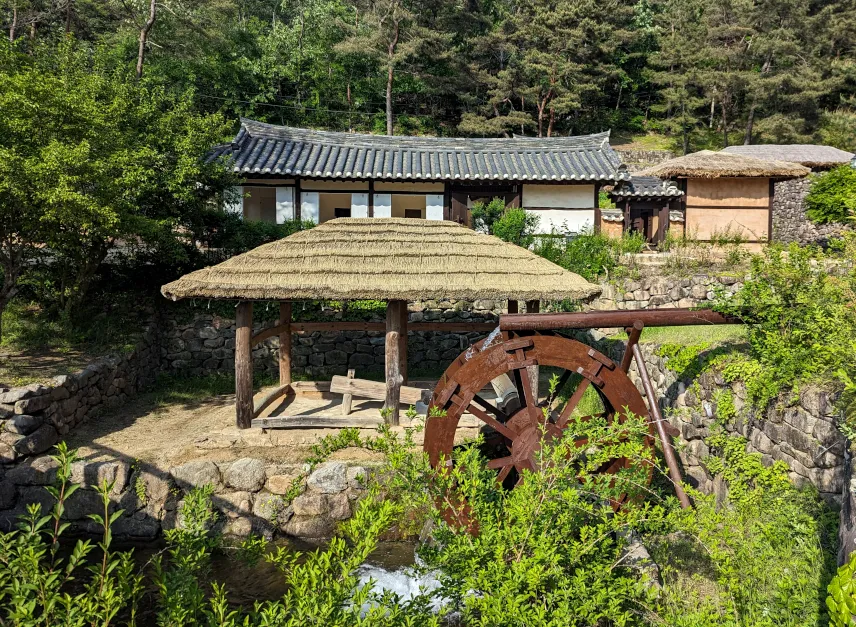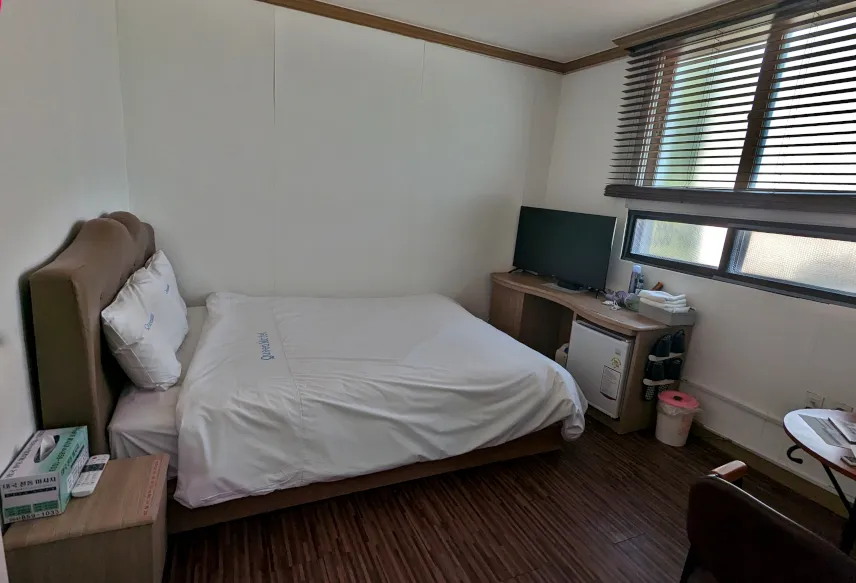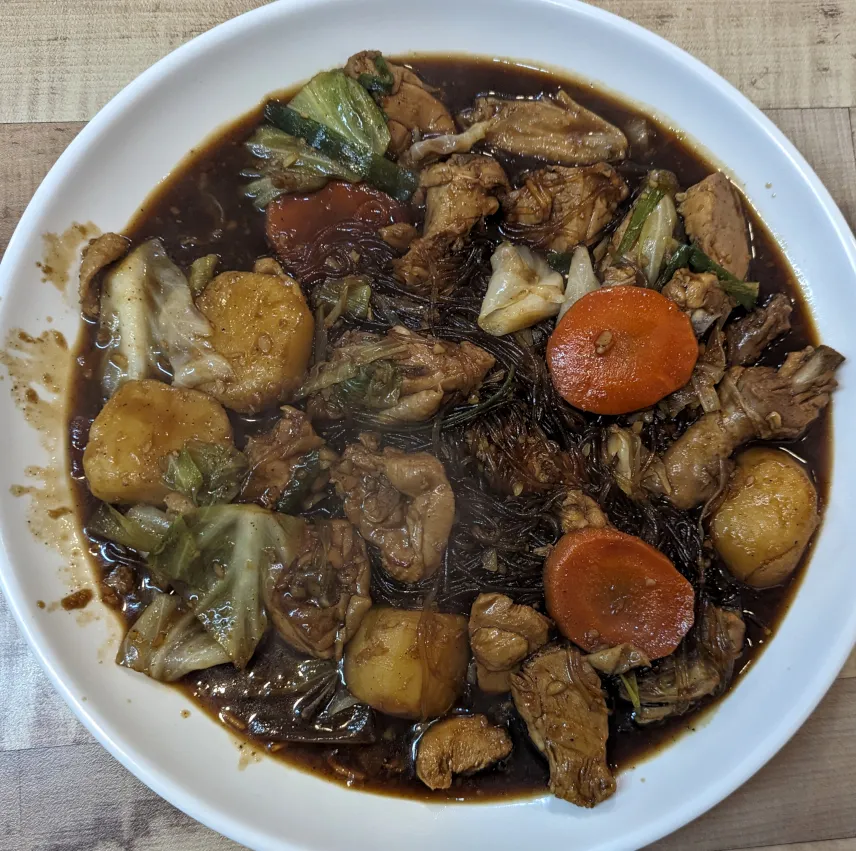
Andong Itinerary & Travel Guide (+ Map)
TL;DR
You have two days in Andong, we have the perfect Andong itinerary for you!
A lot of tourists skip Andong during their travels to South Korea – and we don’t know why. There’s history and culture, arts and crafts, and local delicacies.
We instantly fell in love with Korea’s third-largest city. That’s why we have crafted this 2 day Andong itinerary and travel guide to help you make the most of your time.
2 Day Andong Itinerary
- Get a T Money card to stay mobile.
- Get an eSIM card to stay connected.
- Download Naver Map for navigation.
- Check out our complete South Korea itinerary.
Day 1 – Hahoe Folk Village & Downtown Andong
Morning – Hahoe Folk Village
Start your first day in Andong by ticking off the highlight of your Andong bucketlist: Hahoe Folk Village. Hahoe Folk Village is the main reason many tourists visit Andong. It is listed as a World Heritage Site by UNESCO and rose to even more fame when the late Queen Elizabeth II visited.
You have to buy one entrance ticket which includes
- Entrance to the folk village
- The traditional mask dance performance
- Hahoe Mask Museum
There are several residences and pavilions dotted around the village which are all free to visit.
Hahoe Village sits on the banks of the Nakdong River. On the other side, Buyongdae Cliff overlooks Hahoe Village. We had read about a ferry which crosses the river online but it didn't run at the time of our visit.
You can easily spend a couple of hours here so we have written a whole travel guide about Hahoe Folk Village.

Lunch – Hahoe Marketplace
Hahoe Marketplace near the entrance to Hahoe Folk Village is a great place to try two of Andong’s most famous delicacies: Heotjesatbap and Andong Salted Mackerel.
Afternoon – Mask Dance Performance
Every day between 2 and 3 pm, the Mask Dance Performance takes place. This was one of the most unhinged plays we have ever seen (and we live in Berlin) – you absolutely should not miss it!

Evening – Jjimdak & Downtown Andong
In case you’re hungry after the excitement of the Hahoe Mask Dance Performance, we recommend you to head to Andong Gu Market and try the local speciality Jjimdak. There’s a whole alley full of Jjimdak restaurants so we decided to share a photo of the one we went to because it was amazing!

Afterwards, we recommend a little stroll through downtown Andong north of the old train station.

Day 2 – Bongjeongsa Temple, Seongjingol Mural Village & Wolyeoung Bridge
Morning – Bongjeongsa Temple
Bongjeongsa Temple is the largest Buddhist Temple in Andong. It’s on the UNESCO World Heritage List and of course, it was on Queen Elizabeth’s itinerary when she visited Korea.
The temple houses two national treasures: Geungnakjeon, the oldest wooden building in South Korea, and Daeungjeon, the main temple hall. In total, there are 10 buildings at the main temple and another 9 buildings at Bongjeongsa's two sub-temples found to the east and west of the main temple complex.
Lunch – Okjeong-dong Hanok Village
Once you arrive back in downtown Andong, we recommend a quick pit stop at the Andong Traditional Cultural Contents Museum. It’s small but it’s free. We really enjoyed the surrounding Okjeong-dong Hanok Village with its many art galleries and cafes.
For example, the Hanok Cafe Mid Range is perfect for a lunch break.

Afternoon – Seongjingol Mural Village
Seongjingol Mural Village is located right next to Okjeong-dong Hanok Village. It’s one of the many cultural villages in Korea which are full of street art. We loved all the murals and statues along the narrow alleys winding up the hill – the views from the top were lovely as well.

We slowly continued our way towards Wolyeoung Bridge. If you want to, you can make a beeline to the seven-story brick pagoda at Beopheungsa Temple. It’s the oldest and largest brick pagoda remaining in Korea.

We strongly recommend you make your way up the Nakdong River via the newly constructed promenade on the southern river bank.

Make your way to the Municipal Folk Museum. It’s another free museum that focuses on the history, food, and customs of Andong.
Andong Folk Village is right next door. Here, you can visit reconstructed traditional houses for free.

Evening – Wolyeoung Bridge
Wolyeoung Bridge is another of Andong’s highlights. It is the largest wooden bridge in Korea. It’s especially beautiful around sunset and later when the illumination gets switched on.

We decided to have dinner in Andong Food Street as it was super close to our accommodation. There are loads of Korean BBQ places and other restaurants. We have marked the one we visited on our map.

Quick Andong Travel Guide
Andong Map
Where We Stayed in Andong
We stayed at Queen Motel Andong and could not recommend it any more. The location is absolutely perfect. It’s next to the old Andong train station and hence super central. You can catch buses to all points of interest from Kyobo bus station right around the corner.
Our room was large, clean, and super well-equipped. The staff was amazing. They gave us a bus schedule and even did our laundry for free. You can get free hot drinks in the lobby all day round and there’s also a very basic free breakfast in the morning.

What is Andong Known for?
Andong is mostly known for its folk heritage. Hahoe Village in Andong is on the UNESCO World Heritage List. Here, you can visit the Hahoe Mask Museum and witness the famous Hahoe Mask Dance performance all year round. Additionally, the Andong Folk Festival is held in October.

Is Andong Worth Visiting?
We absolutely think so and honestly have no idea why so many tourists skip Andong. For us, the city had everything our touristy hearts desired: From history over art to delicious food.
We strongly recommend you visit while Korea’s third-largest city still feels like a hidden gem. At least for us, it quickly turned into one of our favourite destinations in Korea.

How Much Time Do You Need in Andong
We think two days are the sweet spot to see all the highlights of Andong including Hahoe Folk Village and Bongjeongsa Temple.
How to Get Around Andong Without a Car
The city centre of Andong is very walkable. Once you want to get out of the centre, things get a little more complicated. You most certainly need to take some sort of transport to get around.
Buses are the most affordable way and we strongly recommend buying a T Money card! We also recommend you get your hands on a bus schedule as buses can be few and far between. We got a bus schedule from our accommodation.
The new bus and train stations are next to each other but quite a bit away from the centre. Buses from here to the central Kyobo bus stop run super frequently though.
If you want to get to Wolyeoung Bridge, you can walk but that will take around 1 hour. Hence, we recommend you take the bus one way and walk the other. Buses to Wolyeoung Bridge only run 6 times per day so you need to plan ahead.
Buses to Hahoe Folk Village run roughly every hour and buses to Bongjeongsa Temple run roughly every two hours.

How to Get to Andong
Here’s how to include Andong in your South Korea itinerary:
Bus from Seoul to Andong |
Train from Seoul to Andong |
|
|
Bus from Gyeongju to Andong |
Bus from Busan to Andong |
|
|

What to Eat in Andong
There are three must-eat dishes in Andong:
-
Jjimdak is made of chicken and vegetables marinated in Korean soy sauce.
It is believed to originate from Andong Gu Market which is nowadays the best place to eat it.
-
Heotjesatbap, a variety of bibimbap, served with soy sauce instead of the typical hot pepper paste.
You can find a lot of Heotjesatbap restaurants around Woryeonggyo Bridge, including Mat 50-nyeon Heotjesabap, the first Heotjesatbap restaurant in Andong.
-
Andong Salted Mackerel or Andong godeng-eo in Korean is a traditional dish from Andong. The fish was salted as a means of keeping it fresh during its transport from the sea to Andong. You can easily find it at Hahoe Marketplace near the entrance to Hahoe Folk Village.
-
Andong Soju deserves an honourable mention. Andong is the heart of the Soju production in Korea. Soju is a s a clear distilled alcoholic beverage which is traditionally made from rice.
The best place to try Soju is the Andong Soju Museum.

Disclaimer: This post contains affiliate links. If you use these links to buy something we may earn a commission. You would help us a lot if you do so. Thanks.



